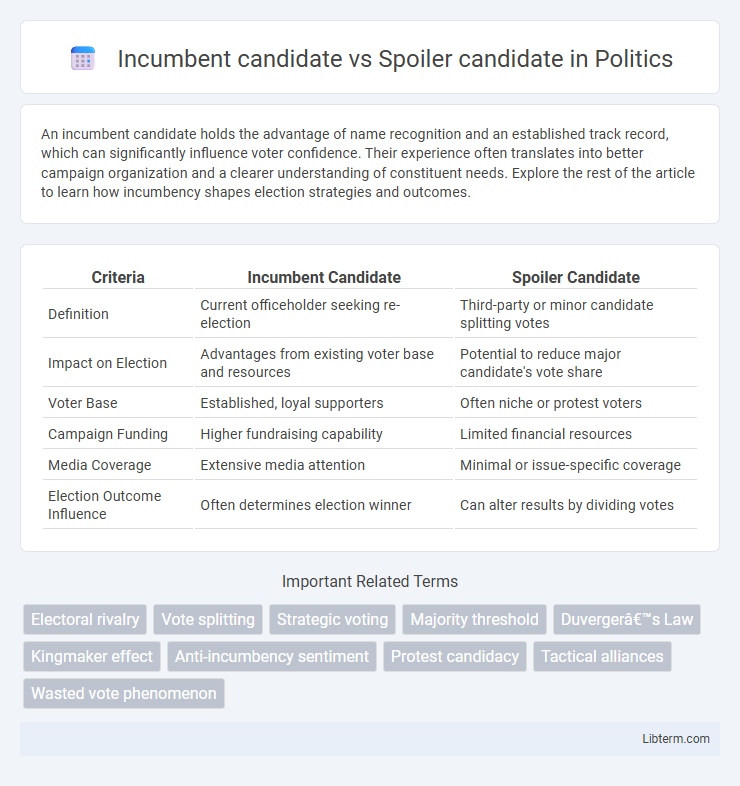An incumbent candidate holds the advantage of name recognition and an established track record, which can significantly influence voter confidence. Their experience often translates into better campaign organization and a clearer understanding of constituent needs. Explore the rest of the article to learn how incumbency shapes election strategies and outcomes.
Table of Comparison
| Criteria | Incumbent Candidate | Spoiler Candidate |
|---|---|---|
| Definition | Current officeholder seeking re-election | Third-party or minor candidate splitting votes |
| Impact on Election | Advantages from existing voter base and resources | Potential to reduce major candidate's vote share |
| Voter Base | Established, loyal supporters | Often niche or protest voters |
| Campaign Funding | Higher fundraising capability | Limited financial resources |
| Media Coverage | Extensive media attention | Minimal or issue-specific coverage |
| Election Outcome Influence | Often determines election winner | Can alter results by dividing votes |
Understanding Incumbent and Spoiler Candidates
Incumbent candidates are current officeholders seeking re-election, often benefiting from name recognition, established voter base, and access to campaign resources, which contribute to their electoral advantage. Spoiler candidates, usually third-party or independent contenders, can influence election outcomes by drawing votes away from major candidates, potentially altering the final result despite having limited chances of winning. Understanding these roles is critical for analyzing electoral dynamics, voter behavior, and the impact of third-party participation in bipartisan systems.
Historical Context: Incumbents vs Spoilers
Incumbent candidates often benefit from established name recognition, political resources, and voter loyalty, providing a historical advantage in elections. Spoiler candidates, historically emerging as third-party or independent contenders, can split the vote, impacting election outcomes by drawing support away from major candidates. Notable examples include Ralph Nader in the 2000 U.S. presidential election, where his candidacy arguably influenced the narrow victory of George W. Bush over Al Gore.
The Role of Incumbency in Elections
The role of incumbency in elections significantly influences voter behavior by providing candidates with name recognition, established political networks, and access to campaign resources, which often leads to higher reelection rates compared to challengers. Incumbent candidates benefit from a track record of legislative achievements and constituent services that enhance their credibility and appeal to voters seeking stability and proven leadership. Spoiler candidates, often third-party or independent contenders, can disrupt electoral outcomes by siphoning votes from major party candidates, but their impact is typically less potent against well-entrenched incumbents due to the latter's institutional advantages.
Spoiler Candidates: Definition and Impact
Spoiler candidates are third-party or independent contenders who, while unlikely to win, draw significant votes away from major party candidates, potentially altering election outcomes. Their presence often shifts the voter base by appealing to similar demographics as a major candidate, thereby splitting votes and influencing the overall result. The spoiler effect can lead to unforeseen victories or defeats, highlighting the strategic challenges within plurality voting systems.
Voter Psychology: Loyalty vs Protest Votes
Voter psychology reveals that incumbent candidates benefit from loyalty due to established trust and perceived competence, often securing a stable voter base. Spoiler candidates attract protest votes by appealing to dissatisfaction with the status quo, motivating voters to express dissent rather than genuine support. This dynamic creates a tension between strategic loyalty and symbolic protest, shaping election outcomes.
Case Studies: Famous Spoiler Effects
In the 2000 U.S. presidential election, Ralph Nader as a spoiler candidate drew crucial votes from Al Gore, potentially swinging Florida to George W. Bush and altering the election outcome. The 1992 presidential race saw Ross Perot's third-party candidacy siphon votes from incumbent George H.W. Bush, facilitating Bill Clinton's victory by highlighting how a strong spoiler can reshape electoral dynamics. Studies of these cases demonstrate the spoiler effect's significant impact on vote distribution, often benefiting the challenger at the expense of the incumbent.
Campaign Strategies of Incumbents vs Spoilers
Incumbent candidates leverage established name recognition, donor networks, and a record of governance to emphasize experience and stability in their campaign strategies. Spoiler candidates focus on differentiating themselves by appealing to niche voter segments, often highlighting issues ignored by major contenders to siphon votes and impact election outcomes. Incumbents prioritize broad coalition-building and media presence, while spoilers invest in targeted messaging and grassroots mobilization to maximize influence despite limited resources.
Media Coverage and Public Perception
Incumbent candidates typically receive more extensive media coverage due to their established political presence and ongoing responsibilities, which often frames public perception around their track record and leadership. Spoiler candidates, in contrast, garner limited media attention but can significantly influence public perception by introducing alternative viewpoints or diverting votes, sometimes being portrayed as disruptors rather than serious contenders. The disparity in coverage shapes voter awareness and narrative focus, often reinforcing the incumbent's dominance while marginalizing spoiler candidates.
Navigating Split Votes and Election Outcomes
Incumbent candidates often face challenges when spoiler candidates enter the race, dividing the electorate and diluting support among similar voter bases. Split votes caused by spoiler candidates can alter election outcomes by siphoning critical votes away from incumbents, potentially enabling less popular challengers to win. Understanding voter behavior and strategic coalition-building is essential to mitigate the impact of spoilers and secure electoral victories in closely contested races.
Implications for Future Elections
The presence of a spoiler candidate can split the vote, undermining the incumbent candidate's chances of reelection and potentially altering the overall election outcome. This dynamic encourages political parties to strategize coalition-building and voter outreach more rigorously in future elections to avoid vote dilution. Electoral reforms like ranked-choice voting gain traction as a solution to mitigate spoiler effects and preserve the integrity of democratic representation.
Incumbent candidate Infographic

 libterm.com
libterm.com